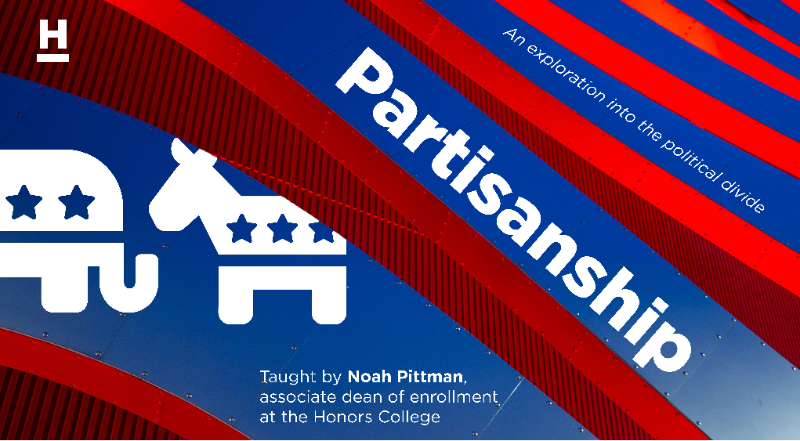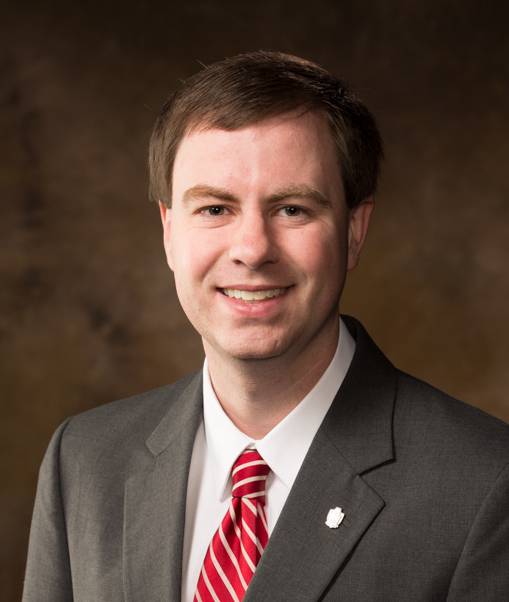Partisanship in the United States

Partisanship in the United States
HNRS 300H1-005
Noah Pittman
Spring 2025
W 5:15 - 6:30 p.m.
GEAR 129
Course Application due Oct. 10, 2024 at 11:59 p.m.
Apply for Honors College Courses
Intense partisanship seems to be everywhere today; good luck spending ten minutes on social media without seeing some form of political antipathy. Even as studies emerge about the many ways Americans are divided in 2024, what often gets overlooked is that partisanship, for better or for worse, has been a key feature of our political system since its founding. In this course, honor students will get to explore the impact of partisanship on the United States throughout its history before analyzing the issues that divide the country today.
The foundation of the course will be the discussion that takes place in the Honors College wing of Gearhart Hall. The course will begin with an examination of some of the most politically divisive eras in American history, periods where it looked as if the United States was beginning to unravel at the seams. Next, the class will focus on the growing partisanship we have seen in recent decades along with some of the contributing factors, such as the ever-increasing role of the internet being used as a communication tool and overall media fragmentation. During the last part of the course, students talk through some of the most intense issues we see debated today, from recent Supreme Court decisions to what is appropriate role of the United States in global affairs today. Throughout the semester, the following questions will be considered:
• In his Farewell Address, George Washington warned that partisanship could severely
harm attempts at creating national unity. Among other things, Washington was concerned
that elected leaders would decide to put the interests of the members of a party ahead
of those of the American public. Was he right?
• In what ways has partisanship impacted the effectiveness of our political institutions?
How can this be addressed?
• Looking at the historical record, can we realistically say that 2024 is the apex
of American political partisanship?
About Noah Pittman
 Dr. Noah Pittman earned a B.A. in political science, summa cum laude, from Rhodes College in Memphis,
Tenn., where he was active in a number of campus groups and won numerous awards, among
them the Yerger Hunt Clifton Scholarship for British Studies at Oxford, the Seidman
Award for Most Outstanding Senior Political Science Major, and the Algernon Sydney
Sullivan Award. During college, Dr. Pittman also interned with Congressman Steve Cohen's
Ninth District Office in Memphis and Harold Ford Jr.'s 2006 U.S. Senate campaign.
At the University of Arkansas, Dr. Pittman completed a M.Ed. in higher education leadership
and a Ph.D. in public policy. Dr. Pittman's dissertation on the Arkansas Scholarship
Lottery and its effects on college participation in the state earned him the William
Miller Dissertation Award from the university's public policy program. Dr. Pittman
currently serves on the College Board's Southwestern Regional Council and the Southern
Association for College Admission Counseling's Extending the Dream Grants Committee.
In recent years, he has taught a number of honors courses related to campaigns and
elections, the American presidency, political partisanship, and higher education policy.
Dr. Noah Pittman earned a B.A. in political science, summa cum laude, from Rhodes College in Memphis,
Tenn., where he was active in a number of campus groups and won numerous awards, among
them the Yerger Hunt Clifton Scholarship for British Studies at Oxford, the Seidman
Award for Most Outstanding Senior Political Science Major, and the Algernon Sydney
Sullivan Award. During college, Dr. Pittman also interned with Congressman Steve Cohen's
Ninth District Office in Memphis and Harold Ford Jr.'s 2006 U.S. Senate campaign.
At the University of Arkansas, Dr. Pittman completed a M.Ed. in higher education leadership
and a Ph.D. in public policy. Dr. Pittman's dissertation on the Arkansas Scholarship
Lottery and its effects on college participation in the state earned him the William
Miller Dissertation Award from the university's public policy program. Dr. Pittman
currently serves on the College Board's Southwestern Regional Council and the Southern
Association for College Admission Counseling's Extending the Dream Grants Committee.
In recent years, he has taught a number of honors courses related to campaigns and
elections, the American presidency, political partisanship, and higher education policy.